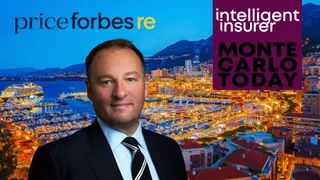
Market needs discipline, not naïve capacity: Price Forbes Re’s Bonard
The Monte Carlo Rendez-Vous has long been the industry’s barometer of sentiment, but this year it comes against a turbulent backdrop of looming hurricanes, biting inflation, and emerging AI exposures.
Key points:
Market rhetoric shifting toward brokers
New capital chasing fees, not risk
Pricing pressure in selective classes emerging
Against that setting, Price Forbes Re president Chris Bonard told Monte Carlo Today that now is a time for cycle management and portfolio discipline – and for Price Forbes Re to step out of the shadows after “quietly building” over the past year to support the company’s defining principle.
“Partnership is a word people overuse,” Bonard stated. “But for us, that’s where it starts. If you look at our company from the top down, all our owners sit around the table together as partners.
“Price Forbes Re wants to be viewed as vital partners for our chosen segments. We view everything as partnership and peer.”
Asked about the broker–reinsurer dynamic, Bonard reached for a cartoon metaphor: “It feels a bit like Tom and Jerry depending who’s in control of the narrative at any given time.”
“Partnership is a word people overuse, but for us, that’s where it starts.”
Reinsurers, he added, have enjoyed a long-overdue profitable cycle, but with brokers continuing to apply pressure on behalf of their clients who feel “they’ve already paid”. That’s creating “a market of reasonableness” in some areas, with price pressure appearing in property cat, high-end retro and crop business.
Casualty, he cautioned, remains an unknown, as Monte Carlo, the unofficial start of renewal season, lands in the middle of hurricane season with plenty of time for significant storms to develop.
The industry has also endured “a year of huge, huge losses”, from California wildfires onward. Bonard believes this year’s messaging will be a balancing act: brokers pushing for relief while reinsurers emphasise “cycle management” and underwriting discipline.
Results vary. “Property, despite what buyers say, has generally performed well. Casualty hasn’t, marine and energy lines haven’t either”, so renewal negotiations will be far from uniform.
Capital on the sidelines
Bonard doesn’t see “a big influx into the market balance sheet or a new balance sheet starting up”. New money is chasing fee revenue and MGA distribution rather than underwriting. While well-run, diversified firms can raise capital, start-ups and underperformers struggle.
“There’s definitely a need for more global capacity,” he said, but much depended on where it flowed. “If it all gets directed at the top end of retro and down into property cat, we’ll see quick softening there, but I don’t see it running heavy into casualty, albeit you could argue that’s where it should start to harden.”
For reinsurers, risk appetite increasingly hinges on quality data, strong management and geopolitical awareness, and Bonard expects more portfolio optimisation “doing more of what you’re good at” but warned against “naïve capacity” chasing unpredictable risks.
The world, he noted, was “more volatile”, with buyers demanding more limit, and Bonard questioned whether “you could buy more limit in the more volatile areas at the right price”.
Renewal as a process
For Bonard, preparation is constant. “We don’t pop up once a year and talk about a renewal. It’s a continuous process.” Monte Carlo is both strategic; with meeting new markets and aligning with clients’ growth plans, and tactical, setting the tone for negotiations. Meetings are short, often only 30 minutes, but “the aim is to make sure we know our clients’ expectations and the market’s expectations”.
Inflation remains a wildcard, especially in casualty and property rebuild costs, while geopolitical instability is piling on the uncertainty. Then there’s AI, and its potential to reshape risk assessment where insurance is “behind many industries”.
Bonard sees Price Forbes Re’s stability as an advantage. “There’s a lot going on between some of the bigger intermediaries. We’re not involved in lawsuits; we’ve been quietly building while some peers are distracted.”
Looking ahead, he believes brokers can add most value by being “advisory-led” and digging into clients’ businesses, spotting gaps and offering solutions across the group, from parametrics to contract wording expertise.
“It’s amazing what you find when you dig deep,” he concluded. “Until clients trust you and understand your capabilities, you can’t get to that stage. That’s how we differentiate ourselves.”
Chris Bonard is group president of Price Forbes Re.
For more news from Monte Carlo Today, click here.
Did you get value from this story? Sign up to our free daily newsletters and get stories like this sent straight to your inbox.
Editor's picks
Editor's picks
More articles
Copyright © intelligentinsurer.com 2024 | Headless Content Management with Blaze

